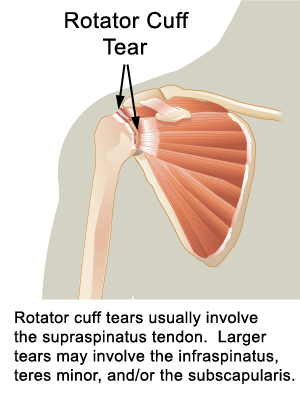Medical Library
Rotator Cuff Tears

Rotator cuff tears happen in younger people when they experience a trauma such as a fall. In middle-aged people and seniors, rotator cuff tears are usually the result of a gradual wearing out of the rotator cuff tendon(s). The signs and symptoms of rotator cuff tears are pain in the shoulder often radiating down to the middle of the arm especially when the arm is raised overhead, weakness, and in severe cases, a complete loss of the ability to lift the arm. Diagnostic tests sometimes include an arthrogram (a radio-opaque dye is injected into the shoulder, and if it leaks out of the rotator cuff, it can be viewed on x-ray) or an ultrasound, but an M.R.I. of the rotator cuff is the most common test used for diagnosis.
Treatment in young and middle-aged patients is usually arthroscopic or open repair of the torn tendons. In older patients, activity modification, anti-inflammatory medication, physical therapy and cortisone injections are typical. Surgery is an option for patients with pain and dysfunction that does not respond to conservative treatment.
Possible Treatments
- Active Assistive Range of Motion Video
- Aerobic/Endurance Exercise Video
- Core Strengthening Video
- Cryotherapy or Cold Therapy Video
- Electrotherapeutic Modalities
- Isometric Exercise Video
- Proprioceptive Neuromuscular Facilitation (PNF) Video
- Proprioception Exercises Video
- Physical Agents
- Shoulder Active Range of Motion Video
- Shoulder Joint Mobilization Video
- Shoulder Passive Range of Motion Video
- Shoulder Resistive Range of Motion Video
- Soft Tissue Mobilization Video
- Stretching/Flexibility Exercise Video
- Active Assistive Range of Motion
Possible Treatment Goals
- Decrease Risk of Reoccurrence
- Improve Fitness
- Improve Function
- Improve Muscle Strength and Power
- Increase Oxygen to Tissues
- Improve Proprioception
- Improve Range of Motion
- Self-care of Symptoms
- Improve Tolerance for Prolonged Activities
- Improve Wound Healing
Additional Resources
Disclaimer
The information in this medical library is intended for informational and educational purposes only and in no way should be taken to be the provision or practice of physical therapy, medical, or professional healthcare advice or services. The information should not be considered complete or exhaustive and should not be used for diagnostic or treatment purposes without first consulting with your physical therapist, occupational therapist, physician or other healthcare provider. The owners of this website accept no responsibility for the misuse of information contained within this website.
